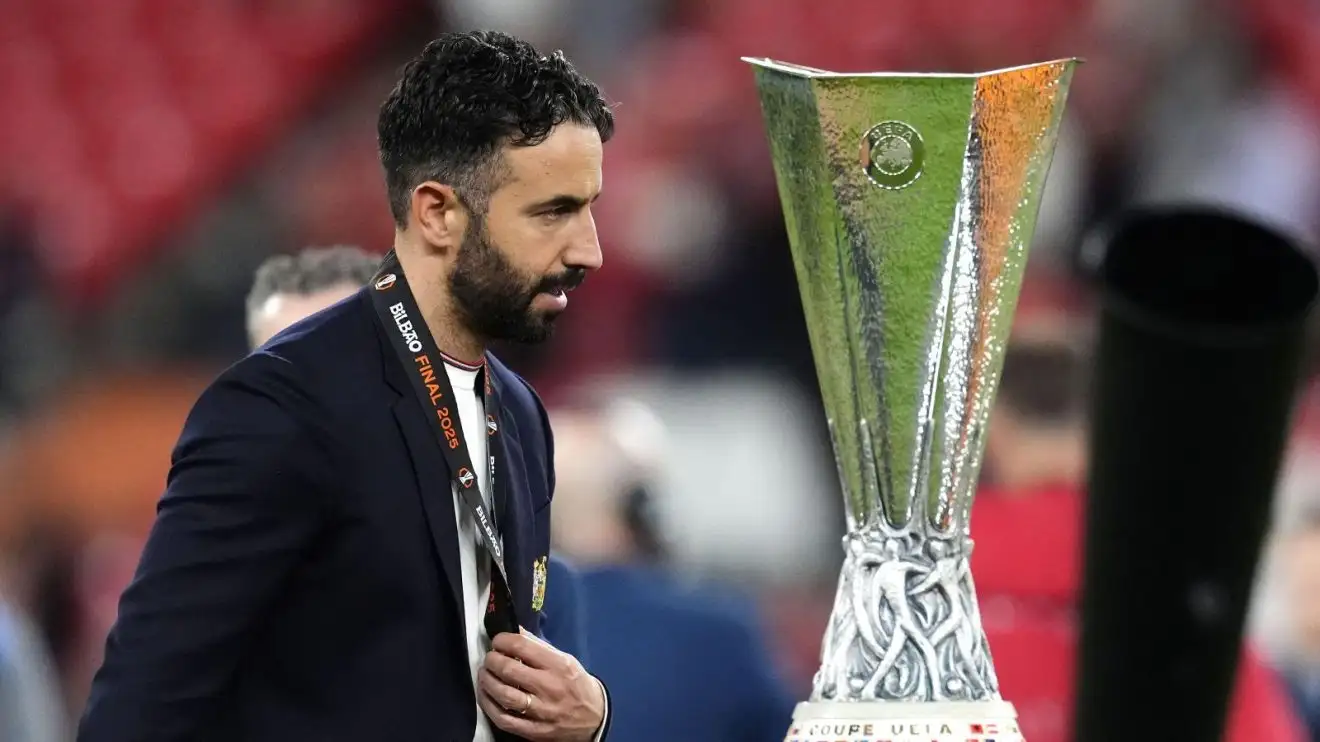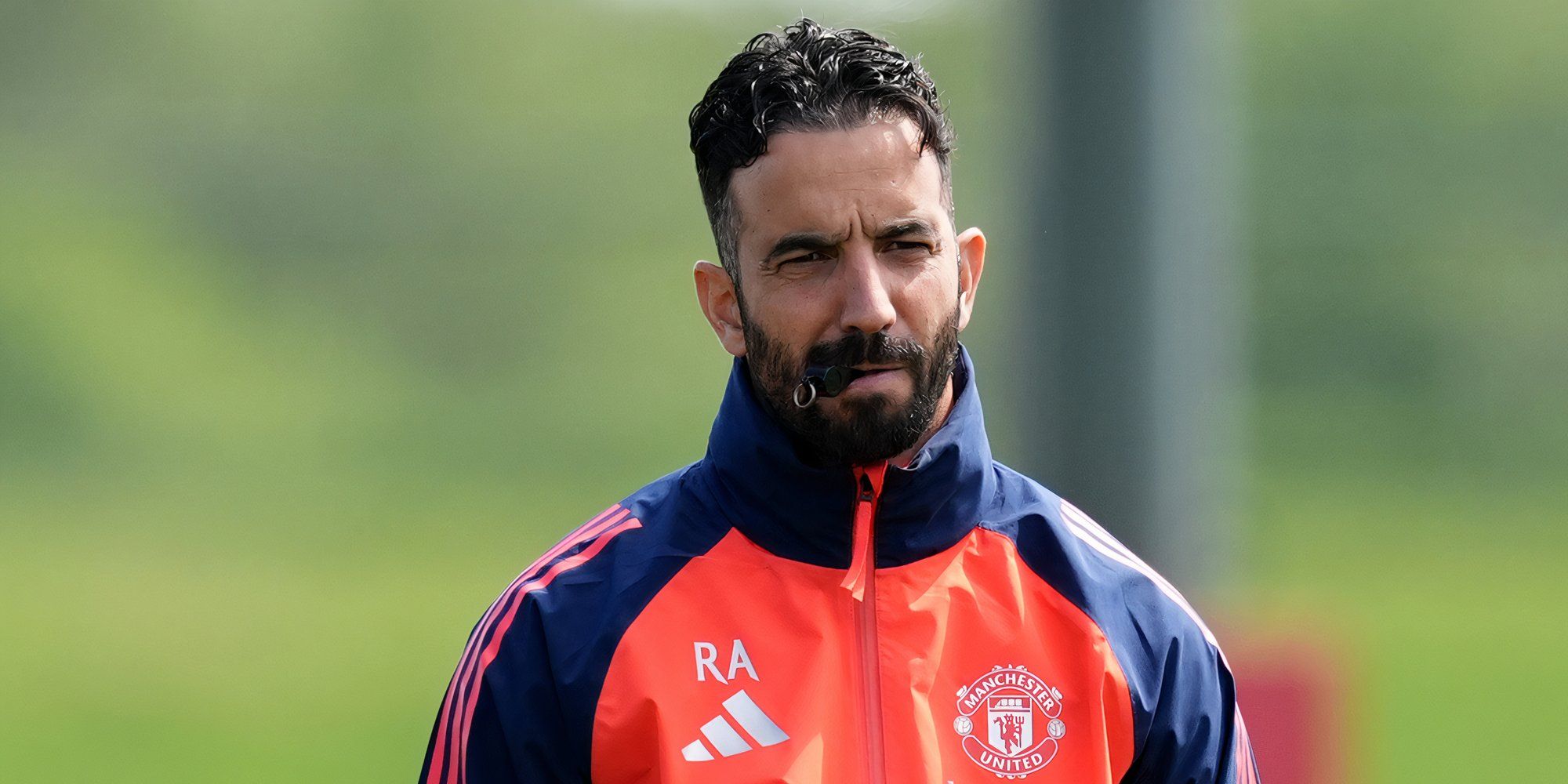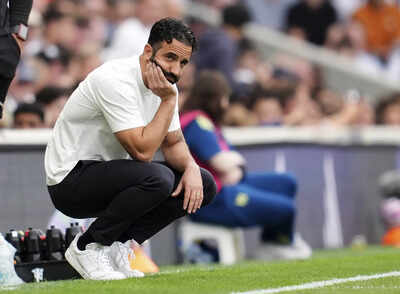In the sphere of modern football, few coaches have made as striking an impression with their tactical ingenuity as Ruben Amorim. His appointment at Manchester United has sparked a renewed debate about tactical revolution, team culture, and the future direction of one of football’s most storied clubs. Known for his bold approach and distinct philosophy, Ruben Amorim is not just a manager but a visionary striving to reshape Manchester United’s identity amidst historical challenges and modern demands. As the club navigates the difficulties of rebuilding, Amorim’s influence, especially through his implementation of the 3-4-3 system, is increasingly seen as a potential game-changer. This article delves into Ruben Amorim’s approach, the tactical intricacies he champions, and what this could mean for Manchester United’s long-term ambitions.
More Manchester United’s 2025–2026 – Navigating Challenges and Aspiring for Glory
Who is Ruben Amorim?

To understand the significance of Ruben Amorim’s tactical philosophy and his potential impact on Manchester United, it is vital to explore his background, transformation into a coaching icon, and his core coaching strategies.
Early Life and Career
Born in Lisbon, Portugal, Ruben Amorim displayed an early passion for football, albeit not initially as a professional player at the highest levels. His journey through various youth and lower-tier clubs laid the foundation for his understanding of the game from grassroots to top-flight coaching. This diverse experience cultivated an appreciation for tactical discipline and player development, which would later define his managerial style.
While his playing career was modest compared to his coaching success, Amorim’s education in football tactics was profound. He combined his on-field experiences with formal coaching credentials, allowing him to approach management with a nuanced perspective—blending pragmatism with innovative ideas. His early managerial stints in Portugal were marked by a deep commitment to attacking football and tactical flexibility, establishing groundwork for his evolving philosophy.
Rise to Prominence
Amorim’s rise to managerial prominence was swift, thanks to his breakthrough at Sporting CP, where he transformed a struggling squad into a dominant force in Portuguese football. His tactical acumen, especially his advocacy for cohesive team movement and aggressive pressing, revolutionized the club’s playing style. His success was characterized by his ability to adapt his strategies to different team strengths, making him one of the most talked-about young coaches in Europe.
His reputation grew as he led Sporting to impressive domestic results and even deep runs in continental competitions. This elevated status made him an attractive candidate for top European clubs, and his move to Manchester United signaled a desire to challenge himself at the highest level. Here, Amorim’s philosophy has been scrutinized, but also celebrated as a blueprint for ambitious, innovative soccer management.
Coaching Philosophy
Ruben Amorim is widely recognized for his clear coaching philosophy centered around attacking fluidity, high pressing, and tactical adaptability. He emphasizes the importance of rapid play transition—moving swiftly from defense to attack—and maximizing team cohesion through precise positioning and coordinated movement.
His approach integrates modern tactical principles with an emphasis on aggressive playing style designed to dominate possession and scoring opportunities while maintaining defensive solidity. Amorim’s philosophy emphasizes tactical discipline, courage to impose his strategies, and fostering a winning mentality in players—traits he deems essential to revive Manchester United’s glory days.
Manchester United: A Historical Overview

Manchester United represents one of the most iconic football clubs worldwide, celebrated for their rich history of triumphs and legendary players. Yet, recent decades have presented complex challenges that threaten to dilute their storied legacy, prompting an urgent search for new identity.
Past Glory
The club’s golden era, led by legendary figures like Sir Alex Ferguson, was characterized by a culture of resilience, attacking football, and managerial stability. Achievements such as numerous Premier League titles and Champions League victories cemented United’s place at football’s summit. Their identity was built on attacking prowess, tactical flexibility, and a winning mentality that inspired generations of fans.
This period established high standards, creating expectations that are difficult to sustain in the modern game. As the club transitioned to different managers after Ferguson’s retirement, the core principles of persistent attacking flair and tactical coherence became increasingly inconsistent, leading to a period of turbulence.
Recent Struggles
In the contemporary landscape, Manchester United has struggled to replicate its former dominance, often criticized for lack of strategic coherence, defensive frailty, and inconsistent performances. The club has gone through a carousel of managers, each striving to impose their own style but often failing to establish a clear, sustained tactical identity.
Players sometimes appear disoriented by tactical changes, and performances have fluctuated markedly. The expectation of returning to former glories has dominated fan discourse, but the reality has been a mix of promising moments and disappointing setbacks. This has led to questions about leadership, team culture, and long-term vision—elements that Ruben Amorim now aims to influence through strategic overhaul.
The Quest for Identity
Amid these struggles, the club’s management has expressed a desire to rebuild around a cohesive tactical philosophy. The search for a unifying style—one that balances attacking intent with defensive resilience—is ongoing. This quest has opened the door for innovative approaches, notably Ruben Amorim’s idea of implementing modern tactical systems rooted in aggressive pressing and swift transitions, aiming to forge a new, resilient identity for Manchester United.
The 3-4-3 System

A cornerstone of Ruben Amorim’s tactical blueprint at Manchester United is the adoption of the 3-4-3 formation. This tactical setup offers flexible options for attacking fluidity and defensive solidity, aligning perfectly with Amorim’s philosophy.
Understanding the Formation
The 3-4-3 system deploys three central defenders, four midfielders, and three forwards, creating a balanced structure that enhances positional flexibility. It allows teams to shift dynamically between attacking and defensive phases, with wing-backs providing width and support. This system encourages high pressing, quick transitions, and coordinated team movement—elements that Ruben Amorim prioritizes.
Players in this formation need to understand their specific roles—defenders must be comfortable stepping into midfield, midfielders should be adept at rotating positions, and forwards must be relentless in exploiting defensive gaps. Such fluidity demands high tactical discipline but also offers expansive attacking options, consistent with Amorim’s attacking philosophy.
Historical Usage of the 3-4-3
Although not unique to Amorim, the 3-4-3 has been employed by several successful coaches like Antonio Conte and Jordi Alonso, who showcased its robustness in Serie A and La Liga, respectively. Its popularity is rooted in its versatility, offering both defensive stability and attacking width.
At different clubs and national teams, this formation has been associated with disciplined pressing and rapid counter-attacks. Yet, Amorim’s adaptation is distinguished by his emphasis on aggressive pressing and direct attacking transitions, rather than solely solidity, marking his tactical imprint on the system.
Amorim’s Unique Adaptation
Ruben Amorim’s take on the 3-4-3 involves specific tweaks—he prioritizes swift attacking transitions and intense pressing, aiming to regain possession quickly and launch immediate attacks. His adaptation involves optimizing player positioning and movement, ensuring that each player understands their role in maintaining cohesion during rapid shifts from defense to attack.
Amorim’s focus on aggression and quick recovery of possession has shown promising signs in early Manchester United matches, though consistency remains elusive. His innovative approach transforms the traditional 3-4-3 into a dynamic, attacking-oriented system that could be key to revitalizing United’s mojo.
Tactical Objectives

The core of Ruben Amorim’s tactical approach encompasses aggressive attacking, rapid transitions, and high-pressing strategies to dominate opponents and control the tempo of the game.
Aggressive Attacking Philosophy
At the heart of Amorim’s tactical ethos is an attack-minded style that seeks to score early and often. This involves high positional intensity, relentless pressing, and quick ball movement to destabilize defenses. The emphasis on attack is not reckless; instead, it’s precise, deliberate, and designed to keep opponents on the back foot.
This philosophy aligns with the historic identity of Manchester United, where offensive football was a defining trait. Amorim’s goal is to reignite that attacking spirit, leveraging the team’s offensive talent to produce fluent, goal-scoring opportunities.
Emphasis on Rapid Play Transition
Amorim is renowned for his focus on swift transition play. As soon as possession is regained, players are instructed to push forward with speed, exploiting the spaces left by opponents’ shifting defenses. The goal is to catch opponents off balance before they organize defensively.
This approach is rooted in high-intensity training and tactical drills that ingrain quick decision-making. Manchester United’s early matches under Amorim have been characterized by numerous shots per game and an aggressive stance, reflecting this strategic priority despite current efficiency issues.
High-Pressing Strategy
Pressing is another cornerstone of Amorim’s tactics. The team is expected to apply high-intensity pressure immediately after losing possession, aiming to regain the ball quickly and keep opponents under constant threat. This strategy necessitates disciplined positioning, intense work rate, and mutual understanding among players.
Effective pressing disrupts opposition buildup and facilitates quick counter-attacks, reinforcing the attacking ethos. While demanding physically, this tactic fosters a combative team culture—something Manchester United has historically cherished and now seeks to restore.
Amorim’s Vision for Manchester United
Ruben Amorim envisions more than just tactical systems; he aims to overhaul Manchester United‘s overall team culture and playing philosophy, aligning with a long-term vision rooted in attacking dynamism, tactical discipline, and player development.
Overhauling Team Culture
Amorim advocates for a shift towards a more proactive, fearless mindset amongst players. He believes that team culture is essential—players should embrace tactical discipline and be unafraid to take risks on the pitch. This entails fostering a collective sense of responsibility, resilience, and belief that attacking football can yield consistent success.
This cultural change is critical for Manchester United to duplicate its glorious days, emphasizing both individual bravery and cohesive team movement. Amorim’s demanding training routines and tactical clarity are instrumental in building this new identity.
Focus on Player Development
One signature element of Amorim’s philosophy is nurturing talent and improving player adaptability. He emphasizes that tactical success depends on player effectiveness and their readiness to embrace new roles. He encourages continuous learning, technical refinement, and mental toughness.
At Manchester United, this translates into an increased focus on youth development, positional versatility, and personalized coaching to maximize individual and collective potential, ultimately aligning with his attacking, proactive style of play.
Introduction of New Philosophies
Amorim’s arrival signifies a paradigm shift—moving away from traditional or defensive setups towards a modern, attacking-oriented system that demands tactical flexibility. This includes integrating data analytics, tailored training sessions, and emphasizing on-field intelligence.
His approach underscores that success stems from meticulous preparation, adaptability, and a relentless pursuit of excellence. The goal is to embed a style of play that is expressive, resilient, and sustainable, aiming for a cohesive team identity that propels Manchester United back to the pinnacle.
Key Tactical Elements in Amorim’s Approach
Certain key elements define Ruben Amorim’s tactical approach—these elements underpin his success and potential for transforming Manchester United.
Positioning and Movement
Amorim emphasizes precise player positioning and dynamic movement patterns. He advocates for players to understand their roles with clarity, ensuring fluid positional exchanges during attacking and defensive phases. This promotes unpredictability for opponents and maintains team balance.
In Manchester United, improving coordinate movement and positional awareness is central to realizing Amorim’s vision. When players align with this tactical mindset, the team can exploit spaces more effectively and provide better defensive coverage.
Importance of Team Cohesion
Consistency in tactical discipline and mutual understanding among players are vital. Amorim’s style relies heavily on synchronized team movements, high pressing, and quick recovery to maintain pressure. He insists on rigorous training to develop this unity, which enhances both offensive potency and defensive resilience.
The cohesion cultivated under Amorim could mark a significant step in stabilizing Manchester United’s fluctuating performances, bolstering morale and collective resilience to adversity.
Players’ Roles in the 3-4-3
Each player in Amorim’s 3-4-3 system has specific responsibilities but must also adapt within the fluid nature of the formation. Wing-backs must attack and defend, midfielders should facilitate transitions, and forwards are expected to press intensely and finish scoring chances.
The success of this approach relies on versatile players who understand their tactical roles thoroughly. This demands a high level of tactical intelligence, physical endurance, and adaptability—traits that Manchester United is keen to develop under Amorim’s guidance.
Analyzing Early Match Performances
Early matches under Ruben Amorim at Manchester United have been promising yet indicative of areas needing improvement, notably in shot efficiency and defensive organization. These performances serve as valuable lessons and opportunities for tactical refinement.
Shot Statistics and Conversion Issues
Despite generating numerous scoring opportunities, Manchester United has struggled with converting chances into goals, a familiar issue rooted in composure, decision-making, or tactical support. Amorim’s emphasis on attacking fluidity aims to improve this, but it requires patience and further tactical tweaks.
This discrepancy between attacking volume and goal output underscores the importance of refining finishing skills and understanding how to exploit defensive gaps more effectively, a key focus for Amorim moving forward.
Highlights of Key Matches
Admittedly, some early fixtures have shown flashes of what Amorim’s philosophy can achieve—dynamic transitions, intense pressing, and cohesive movement. For instance, in matches where the team pressed high and transitioned quickly, they established dominance and created scoring opportunities.
Conversely, mistakes in defensive positioning and slow reactions have cost points. Analyzing these performances is crucial to consolidating strengths and correcting weaknesses.
Learning from Early Setbacks
Setbacks such as conceding goals from counter-attacks or losing possession in critical moments highlight areas for tactical adjustments. Amorim’s message centers on resilience and continuous learning, emphasizing that these early experiences will inform future improvements.
The initial performances serve as a live laboratory, shaping the implementation of his tactical approach to ensure prime effectiveness as the team matures under his guidance.
Strategic Improvements Proposed by Amorim
While Amorim’s tactical blueprint is ambitious, he recognizes the importance of balancing attack and defense. He advocates for strategic adjustments aimed at enhancing team stability and offensive output.
Balancing Attack with Defense
Amorim is aware that aggressive pressing can create defensive vulnerabilities. Therefore, he emphasizes maintaining compactness during transitions and ensuring players support each other to cover gaps.
This balancing act is critical as Manchester United seeks to sustain a high-pressing game without succumbing to counter-attacks—an area where tactical discipline and fitness levels are paramount.
Enhancing Offensive Capabilities
To score more goals, Amorim advocates for increased precision in final third play, better positioning, and exploiting set-piece opportunities. This involves selective risk-taking, leveraging the strength of forwards, and developing patterns of play to break down disciplined defenses.
He also emphasizes improving shot accuracy and decision-making under pressure, vital for translating attacking chances into tangible results.
Adapting Training Methods
Amorim’s disciplinary and tactical rigor is reflected in his training regimens—focused on quick transitions, pressing drills, and positional awareness. He encourages a culture of accountability, where players understand the importance of every tactical detail.
Continuous adaptation of training methods ensures the team remains dynamic and vigilant, ready to adjust tactics according to opponents and match situations.
Player Adaptation Challenges
Transitioning to the New System
Adapting to Ruben Amorim’s demands requires a significant shift in player mindset and skill sets. Veteran players accustomed to previous systems may resist or struggle with the aggressive pressing, positional fluidity, and quick decision-making that the tactical overhaul entails.
Overcoming such resistance involves effective communication, tailored coaching, and fostering a culture of growth and adaptation. The process, while challenging, is essential to unlocking the team’s full potential.
Resistance to Change
Within the squad, some players might prefer familiar roles or tactical stability, leading to resistance. Amorim’s approach demands courage and resilience, pressing players to embrace challenge and development.
While difficult, overcoming resistance is vital for tactical coherence, and those who adapt quickly will likely become instrumental in realizing his vision.
The Role of Experienced Players
Veterans serve as both anchors and catalysts within this tactical transition. Their experience can stabilize moments of upheaval, but they also need to embrace the evolving tactical style. Amorim has emphasized integrating experienced players into the new system, providing mentorship and ensuring tactical consistency.
Aligning experienced squad members with this innovative approach is key to building a resilient and flexible team capable of competing at the highest level.
Performance Critics and Supporters
Press Reaction
Media outlets are divided—some applaud Amorim’s innovative tactics and potential for a tactical renaissance, while others question whether Manchester United is ready for such radical change. Critics point out that early results remain inconsistent, and patience is required.
Supporters see this as a necessary evolution, providing the club with tactical depth, unpredictability, and attacking verve reminiscent of United’s glorious past.
Fan Expectations
Fans, historically passionate and demanding of success, often oscillate between optimism and skepticism. Amorim’s promise of attacking football aligns with fan desires, but they remain cautious until tangible results materialize.
As performances improve and results turn favorable, fans’ confidence is expected to grow, bolstering Amorim’s authority and support system.
Internal Perspectives
Within the club, management and players hold mixed views—some believe in Amorim’s innovative approach to bring long-term success, while others worry about the risks associated with radical tactical shifts. Communication and shared vision will be crucial for continuity and success.
A unified internal stance, emphasizing patience and collective effort, is vital to translating performance improvements into sustained victories.
The Impact of Amorim’s Arrival on the Squad
Ruben Amorim’s arrival marks a new chapter, prompting significant changes in training, morale, and squad composition, all aimed at maximizing tactical effectiveness.
Changes in Training Regimen
Amorim implements intense and precisely structured training sessions. Emphasis is on quick transitions, pressing drills, and positional awareness. These adaptations are designed to cultivate the team’s tactical cohesion and physical resilience required for his philosophy.
The training philosophy strives to ingrain discipline, decision-making speed, and fluid movement into daily routines, preparing players for the demands of high-press systems and fast counter-attacks.
Influence on Player Morale
Having a coach with a clear, ambitious vision can invigorate morale, inspiring players to rise to the challenge. Amorim’s approach encourages accountability, skill development, and collective effort, fostering a competitive mindset.
However, initial struggles hint at the psychological adjustment needed for players to fully embrace this high-intensity style. Continuous support and leadership are essential to build confidence and cohesion.
New Signings and Tactical Fit
To optimize the tactical system, Manchester United might pursue strategic signings—players adept at pressing, quick transitions, and versatile roles within the 3-4-3 setup. Amorim’s influence dictates a focus on specific attributes such as stamina, tactical intelligence, and technical skill.
Balancing existing squad strength with targeted acquisitions will be crucial to fully realize his footballing philosophy and build a cohesive, attacking unit.
Future Prospects for Manchester United under Amorim
While the path is challenging, the potential for Manchester United to reinvent itself under Ruben Amorim is substantial. With strategic patience and tactical refinement, the club could reclaim its place among Europe’s elite.
Potential for Success
Amorim’s innovative approach offers the blueprint for sustained attacking football, tactical discipline, and resilience—hallmarks of successful teams. If implemented correctly, Manchester United can emerge as a cohesive, formidable squad capable of competing both domestically and in Europe.
Early signs suggest that with continued adaptation, the team can harness Amorim’s tactical philosophy to produce a new era of success.
Long-Term Vision
The long-term vision involves cultivating a distinctive playing style rooted in aggressive pressing, swift transitions, and fluid movement. This demands continuous development, tactical flexibility, and nurturing young talent.
If sustained, this approach can serve as a catalyst for rebuilding Manchester United into a modern powerhouse, balancing tradition with innovation.
Need for Patience
Success under such a transformative tactical model cannot be instantaneous. It requires patience from management, players, and supporters alike. Incremental improvements, coupled with resilience, will eventually solidify Amorim’s philosophy into Manchester United’s identity.
Patience and persistence will be critical as the club navigates this period of strategic transition toward greater heights.
Notes
This article reflects an in-depth analysis of Ruben Amorim’s potential influence on Manchester United, blending tactical insights, historical context, and strategic evaluation to showcase a compelling future. The evolving nature of football tactics highlights that success depends on adaptability, player buy-in, and patience—elements that fit well within Amorim’s forward-thinking mindset.
Mistakes to Avoid
Overlooking Player Input
While Amorim emphasizes tactical discipline, neglecting players’ opinions and adapting his approach accordingly could hinder progress. Successful implementation relies on mutual understanding and respect, ensuring players are committed to tactical goals.
Ignoring Tactical Flexibility
Rigid adherence to a single system risks predictability, allowing opponents to exploit weaknesses. Amorim’s strength lies in adaptability; ignoring this trait could result in failure to respond effectively to different challenges.
Underestimating Opposition
Despite confidence in his tactics, Amorim must remain aware of opposition strategies and exploit their weaknesses without overcommitting or losing tactical discipline. Strategic planning against adaptable opponents is crucial.
Frequently Asked Questions
What makes Amorim’s tactics unique?
Ruben Amorim’s tactics integrate aggressive pressing, rapid transitions, and fluid positional play within an adaptable 3-4-3 formation, emphasizing attacking dominance and tactical discipline.
How long will it take for the team to adapt?
Adapting to Amorim’s system typically takes several months, involving continuous training, tactical adjustments, and psychological resilience. Patience from all stakeholders is key.
What are the key challenges Amorim faces?
Main challenges include player adaptation, maintaining tactical discipline, balancing attack with defense, and fostering a cohesive team culture amid high tactical demands.
How does player performance impact Amorim’s tactics?
Player effectiveness, technical skills, and tactical intelligence directly influence tactical execution. Ineffective performances can undermine the system’s success, emphasizing the importance of player development.
Can United return to its former glory under Amorim?
With strategic patience and full implementation of his tactical philosophy, Manchester United has the potential to emerge as a dominant force once again, driven by an attacking, disciplined style of play.
Conclusion
Ruben Amorim’s innovative tactical approach presents both an exciting opportunity and a formidable challenge for Manchester United. His emphasis on aggressive pressing, quick transitions, and fluid movement seeks to revive the club’s attacking legacy, while instilling modern tactical discipline. Although early performances highlight promising signs and areas needing refinement—particularly in finishing and defensive stability—the long-term prospects remain optimistic with patience, resilience, and strategic adaptation. If Amorim’s philosophy is fully embraced and executed, Manchester United could return to its historic status as a powerhouse, blending tradition with modern innovation to forge a new era of success fueled by tactical brilliance and collective cohesion.

